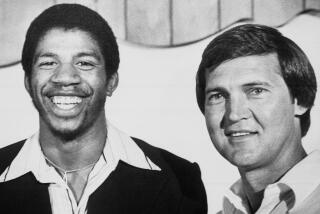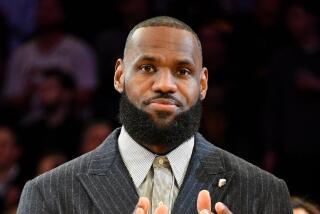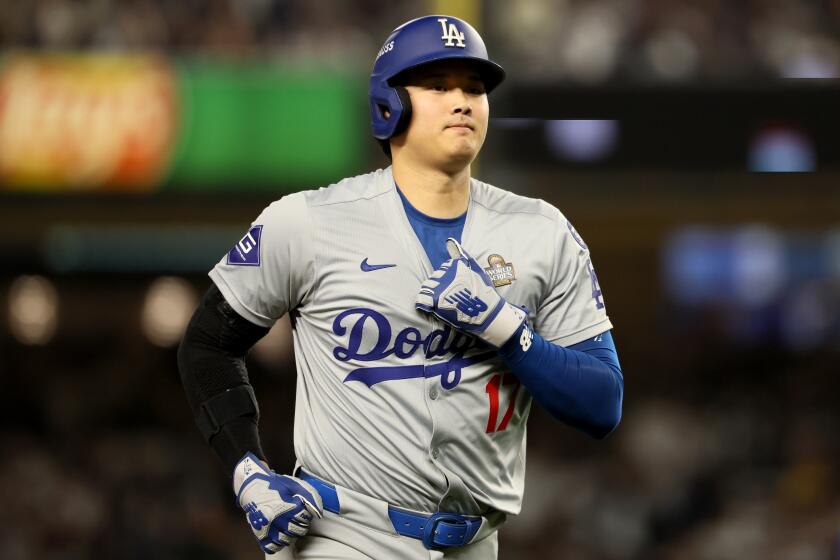RIGHT PERSON RIGHT TIME
In these final years of the American Century, the American Dream waded ashore in Italy. In the land of the papacy, of Michelangelo and Galileo and Leonardo Da Vinci, within sight of the canals of Venice and within earshot of the romantic singing gondoliers, a kid hawked his wares to tourists.
Jewelry? Leather? Postcards? Good guesses all.
The kid was selling baseball caps. Chicago Bull baseball caps.
A Chicago bull? To a kid in Italy, a Chicago bull might well be a cousin of the ones the matadors fight in Spain. A Chicago Bull, capital B, that’s Michael Jordan.
Is Jordan the greatest athlete of the century? That’s debatable, if greatness is defined strictly by athletic performance. The Times’ poll ranks Jordan No. 1, but no apologies would be necessary for Muhammad Ali or Babe Ruth, for Pele or Carl Lewis, for Jesse Owens or Jim Thorpe. The Times encouraged voters to define greatness as they saw fit.
If greatness extends beyond the field of play, many say Jordan wins in a landslide. He transcended sport and emerged as arguably the most famous face on the planet, a globally recognized emissary of the dominant culture and economic system in the world today.
“Michael Jordan is in Paris,” the newspaper France-Soir reported breathlessly in 1997. “That’s better than the Pope. It’s God in person.”
Fame and fortune, if not deification, were built upon a foundation of spectacular athletic success. Jordan’s Bulls won six NBA championships within eight years. The two years they didn’t, Jordan was on his baseball sabbatical. Jordan won a record 10 NBA scoring titles and, in each of his six NBA finals appearances, earned the award as most valuable player. His final shot had a mythical quality to it, as he posed to admire the jump shot that slipped one last championship ring onto his finger.
His artistic flair was not only immortalized but commercialized. His “Air Jordan” shoes drove kids into a consumer frenzy usually reserved for passing fads--and cheaper fads--like Pokemon or Tickle Me Elmo. The “Jumpman” silhouette, the logo of the Jordan Brand line of apparel and shoes, was adapted from his globally televised flight in which he took off from the free-throw line and soared airborne, legs apart like scissors, leaning, reaching, dunking, then descending.
If the NBA had Jordan’s shrewd sense of timing, the league would have forever suspended its annual slam-dunk contest the moment Jordan landed. Why ask a kid to follow Sinatra to the microphone?
To describe Jordan as a superstar seemed woefully inadequate. Jordan was blessed with “extraordinary genius,” University of California sports sociologist Harry Edwards said.
“Because of that dimension of the extraordinary, he represents the best and greatest potential of the species--a Gandhi, an Einstein, a Michelangelo,” Edwards said. “If I were charged with introducing an alien life form to the epitome of human potential, creativity, perseverance and spirit, I would introduce that alien life form to Michael Jordan.”
Hyperbole, perhaps, but Gandhi could not back up his genius with Nielsen ratings. When Jordan left for the baseball diamond, the NBA finals lost about 10 million viewers, roughly one-third the American television audience. When Jordan returned to the finals, so did those casual fans.
Jordan’s reach extended far beyond America’s shores. The kid in Italy peddled Bull caps, but so did kids in Israel and Iran, in Asia and Africa and South America. Jordan’s retirement commanded the first three pages of the French national sports daily L’Equipe. “His only rival globally,” David Halberstam wrote, “was England’s Princess Diana.”
American soccer star Alexi Lalas said teammates on his Italian soccer club, playing the most popular sport in the world in perhaps the most competitive league in the world, spoke of Jordan with awe, even those “who couldn’t name three other NBA players and who couldn’t play basketball to save their lives.”
“People around the world like American culture, and Jordan has the whole image--cool and talent,” Lalas said. “Michael Jordan is like rock ‘n’ roll.”
Jordan’s magic can be summarized in six words: right person, right sport, right time.
The Boston Celtics were a dynasty, but before cable TV. The New York Yankees were a dynasty, but before color TV. Ali was a sports hero, but far too controversial for commercial appeal. Pele was a sports hero, but Americans didn’t much care for soccer.
As the NBA rode Magic Johnson and Larry Bird to unprecedented popularity in the 1980s, Commissioner David Stern sold his sport by selling his stars, here and abroad. In basketball, the stars were in your face, up close and personal, not hidden beneath a football helmet or stranded in a baseball outfield.
And, as the Soviet Union collapsed and the Berlin Wall crumbled, the world’s last remaining superpower exported its culture and technology. By radio and television, by cable and satellite, in magazines and in movies, Americans conquered the youth of the world.
Soviet teenagers used to beg, borrow and steal to get their hands on a pair of Levi’s. Today, Americana rules. When Americans travel abroad, few are the places they can go to escape CNN and MTV, Coca-Cola and McDonald’s, Madonna and “Star Wars.”
I once saw the Red Hot Chili Peppers, a fine Los Angeles rock band, in concert in a packed gym in Barcelona. Not a word of Spanish was uttered. Didn’t matter.
It was in Barcelona, in 1992, where Jordan might have clinched the title of greatest athlete in the 1900s. The Olympic Games, the greatest sports festival of all, requested the presence of Jordan and Co., the Dream Team. Never mind the fans. With the mere sight of Jordan, championship athletes in all sports, from all countries, morphed into screaming teeny-boppers hoping for a wink, a touch, maybe even a sock from their idol.
Granted, Stern’s marketing machine would have transformed the best player in the NBA into a global celebrity, whoever he was. The genius of Jordan--and his agent, David Falk--was in marrying capitalism to celebrity, deploying technological wizardry to not only feed the hunger for American culture but develop an appetite where none had existed.
“We’ve gone into countries where they don’t have a clue about what a sports beverage is, but they know Michael,” Gatorade marketing executive Bill Schmidt said last year. “He’s instant validation.”
When Nike was recruiting Jordan in 1984, he did not simply send his agent to talk turkey. Jordan accompanied Falk to visit Nike, stunning company officials by asking who would design his signature shoe. Nike hitched its corporate wagon to Jordan, hiring film director Spike Lee to produce the Air Jordan commercials that humanized him and, at the same time, celebrated his wondrous athletic ability.
Jordan and Falk signed up with McDonald’s, Coca-Cola, Gatorade, Hanes, WorldCom and other major corporations Jordan simply referred to as “my partners.” But the Nike loyalty never wavered, and no wonder.
When Fortune estimated the financial effect of Jordan’s career at $10 billion--ticket sales, merchandise sales, television revenues, endorsement payments and more-- the magazine calculated his economic impact on Nike alone at $5.2 billion. So, as Jordan shifted from pitching someone else’s products to pitching his own, Nike was more than happy to collaborate in his Brand Jordan line of shoes and apparel.
Falk’s success at branding Jordan revolutionized the business of sports representation. Jordan is not merely SI but GQ too; the men’s fashion magazine once saluted him as “the most styish man in America.”
As athletes increasingly view themselves as entertainers, today’s sports prodigy demands his agent not only negotiate a lucrative contract and endorsement deals but extend stardom into fashion, television, movies, music and video games.
A shoe deal is nice, but “Space Jam” is better. And how about a fragrance? Michael Jordan Cologne, with a silhouette of Jordan’s bald head as its logo, offers an “olfactive experience” that features “essences of cypress, rosewood, geranium and cognac.” Not long ago, Jordan would have been laughed out of the locker room, tagged as effeminate.
Rap music star Master P’s fledgling sports agency, whose clients include Heisman Trophy winner Ricky Williams, offers athletes the chance to sing, dance, appear in music videos or just hang out at Hollywood parties. In order to prevent clients from jumping ship, several prominent sports agents have sold their practices and joined forces with entertainment companies--Falk included.
The Jordan lore, told and retold across the country and around the world, embraces the common man even as Jordan’s feats eclipse those of any common man. Jordan was cut from his high school team, so never give up. For all his athletic ability, he couldn’t make the grade in baseball, so no one succeeds at everything. He made champions of the long-suffering Bulls, never begging to escape to the glamour of the Lakers or elsewhere, so give it your best shot and stay loyal. He dismissed teammates as “my supporting cast” and ridiculed Bull General Manager Jerry Krause, but who among us has never belittled co- workers or bosses?
When his father was murdered, Jordan wept. When Jordan retired, he gracefully opened his globally televised news conference by offering condolences to the family of a slain Chicago police officer.
“A lot of times, when athletes are interviewed, people don’t pay attention,” Yankee star Derek Jeter said. “When you’re flipping through channels and you see Michael Jordan, you’ll stop and listen. I don’t think he speaks unless he knows what he’s talking about.”
That quality brings forth objections from activists dismayed by Jordan’s refusal to embrace political and social causes. Fellow sports giants, among them Jim Brown and the late Arthur Ashe, have rebuked Jordan on that score.
Before endorsing Reebok, Women’s World Cup hero Julie Foudy traveled to Pakistan to assure herself the company did not contract with factories using pitifully paid child laborers. Jordan said nothing when a similar controversy surrounded Nike. In a Senate race in his home state of North Carolina, Jordan resolutely declined to endorse Democrat Harvey Gantt, a former Charlotte mayor and black challenger to Republican Jesse Helms.
“Jordan uses his clout to peddle sneakers and star in unwatchable movies with Bugs Bunny, leaving the very distinct impression that he has the social consciousness of a baked potato,” John Schulian wrote in GQ, which selected Ali as its athlete of the century.
Jordan once remarked, half-jokingly, that he passed on Gantt because Republicans bought sneakers too. It was not that Jordan was not smart enough to speak up; it was that he was smart enough not to. Jackie Robinson campaigned for Richard Nixon and later regretted it. Sure, Jordan might alienate his Nike-buying public with a partisan view. But, more important, who appointed him a national conscience when he--like most Americans--did not know or care much about politics?
“The issue of trading with Indonesia without regard to human rights or child labor is fundamentally a matter that United States trade policy must address,” the Rev. Jesse Jackson said. “It isn’t right to shift the burden to him because he’s a high-profile salesman.”
And the concept that Jordan, as a high-profile black man from North Carolina, should have naturally endorsed a black Democrat is an anachronism many political commentators have yet to acknowledge. The “black vote” is no longer monolithic, as America increasingly divides more intractably along lines of class rather than race.
To label Jordan as middle class, of course, is ludicrous. But we ask our sports heroes to be role models, and here Jordan triumphs. The previous generation of black activists never imagined a black man as the foremost corporate spokesman in America. And, to a growing black middle class--and to a younger generation of Americans of all colors--Jordan shared his success story.
Be like Mike? On the basketball court, no one can. But who could not strive to do his job with style and grace, without shaming his family? Who could not strive to excel in his field, to command the respect of his peers and the attention of his community, to do so well that he could not only work for himself but provide jobs for others? In this American Century, Michael Jordan is the American Dream.
*
--Besides personal reporting, sources for this story included the Chicago Sun-Times, Chicago Tribune, Fortune, GQ, New Yorker, Salon and “Playing for Keeps: Michael Jordan and the World He Made” by David Halberstam.
More to Read
Go beyond the scoreboard
Get the latest on L.A.'s teams in the daily Sports Report newsletter.
You may occasionally receive promotional content from the Los Angeles Times.











